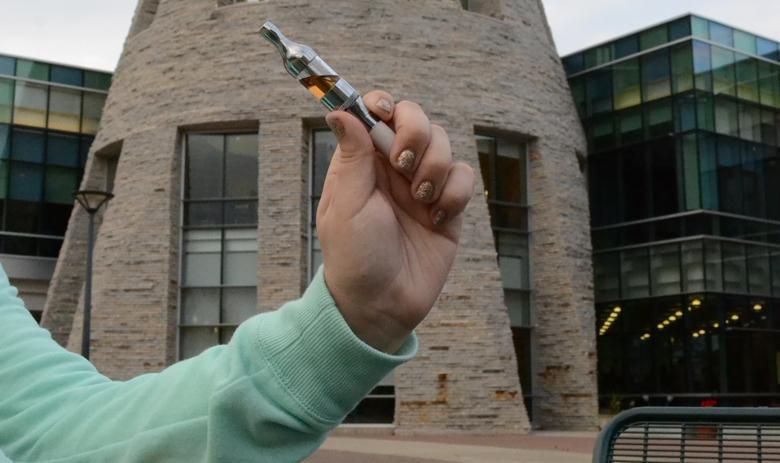Steve Bequette dipped tobacco for several years.
When he played baseball, dipping was part of the sport. It was also easier to dip in a vehicle during his law enforcement days, before he came to USI as Public Safety Assistant Director.
When the tobacco-free policy went into effect in July 2011, he quit dipping – “cold turkey.”
“This is the longest I’ve ever gone. I can tell a difference. So it’s definitely a health benefit,” Bequette said. “It’s been tough.”
But there is an alternative to smoking and chewing on campus that students choose to indulge in: e-cigarettes.
E-cigarettes contain flavored water vapor with an option to infuse nicotine in it when a person takes a puff.
“I’ve heard rumors about it (e-cigarettes on campus), and I think that our campus proportionally follows local and national trends,” Bequette said.
Most states are categorizing them with tobacco products, he said.
According to a Washington Post article, four states and Washington D.C. have included e-cigarettes in indoor-smoking bans with three more following suit. The article also mentions nine more states that categorize e-cigarettes as tobacco products.
USI also lumps e-cigarettes into its policy against cigarettes; therefore, “e-cigs” are not allowed on campus.
“It was included because of the unknowns,” said Dave Enzler, Tobacco-Free USI Committee co-chair.
The committee decided it wanted to promote a healthier environment.
“Smoking (traditional) cigarettes does impact everyone either by litter or second-hand smoke,” Enzler said.
Students may get away with smoking e-cigarettes because the vapor disappears quickly, and the odor doesn’t stay behind as long as traditional cigarette smoke does, he said.
Enzler encourages anyone who uses e-cigarettes to at least take their habit to the parking lot.
“Technically, the parking lots are tobacco-free, too, but it’s at least out of the way of those walking around on campus,” he said.
Several new businesses selling e-cigarettes have popped up in the Evansville area.
One of the main reasons people use e-cigarettes is to stop smoking actual cigarettes.
“There is a lot of conflicting research out there,” said Christine Johnston, RFWC assistant director for student wellness. “Most of the research was done by the manufactures of e-cigarettes.” Other countries make e-cigarettes as well, Johnston said.
“I’ve read three studies about e-cigarettes because really that’s all that’s out there,” she said.
Johnston found one study from Greece which shows people who use e-cigarettes have an increase in heavy breathing.
“But the research isn’t really there yet to know a whole lot,” she said.
Most people are dual users – and it’s hard to separate out what a traditional cigarette is doing and what the e-cigarette is doing.
“The vast majority of people are using nicotine, so people are still using the addictive substance,” Johnston said.
Nicotine can increase heart rate and blood pressure.
“Nicotine alone isn’t really a safe substance,” Johnston said. “Most people don’t use nicotine in high enough rates to really get nicotine poisoning, but it is possible. Some of the negative side-effects from tobacco smoking are attributed directly to nicotine itself.”
The Tobacco-Free Policy is a campus-community effort, Bequette said.
“The burden has been placed on building heads, department heads, directors and deans of colleges in their respective areas that in spirit of the policy – if you see someone not abiding by it, you ask them to stop,” he said. “Most people comply, but a lot of people try to skirt it, yes, as evident of cigarette butts on the ground outside in certain areas.”



